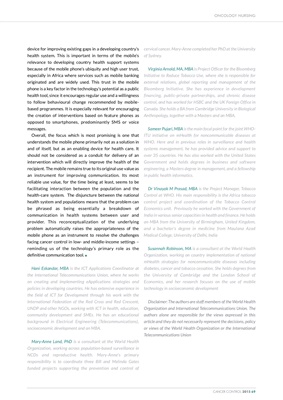
device for improving existing gaps in a developing country's
health system. This is important in terms of the mobile's
relevance to developing country health support systems
because of the mobile phone's ubiquity and high user trust,
especially in Africa where services such as mobile banking
originated and are widely used. This trust in the mobile
phone is a key factor in the technology's potential as a public
health tool, since it encourages regular use and a willingness
to follow behavioural change recommended by mobilebased
programmes. It is especially relevant for encouraging
the creation of interventions based on feature phones as
opposed to smartphones, predominantly SMS or voice
messages.
Overall, the focus which is most promising is one that
understands the mobile phone primarily not as a solution in
and of itself, but as an enabling device for health care. It
should not be considered as a conduit for delivery of an
intervention which will directly improve the health of the
recipient. The mobile remains true to its original use value as
an instrument for improving communication. Its most
reliable use value, for the time being at least, seems to be
facilitating interaction between the population and the
health-care system. The disjuncture between the national
health system and populations means that the problem can
be phrased as being essentially a breakdown of
communication in health systems between user and
provider. This reconceptualization of the underlying
problem automatically raises the appropriateness of the
mobile phone as an instrument to resolve the challenges
facing cancer control in low- and middle-income settings -
reminding us of the technology's primary role as the
definitive communication tool. l
Hani Eskandar, MBA is the ICT Applications Coordinator at
the International Telecommunications Union, where he works
on creating and implementing eApplications strategies and
policies in developing countries. He has extensive experience in
the field of ICT for Development through his work with the
International Federation of the Red Cross and Red Crescent,
UNDP and other NGOs, working with ICT in health, education,
community development and SMEs. He has an educational
background in Electrical Engineering (Telecommunications),
socioeconomic development and an MBA.
Mary-Anne Land, PhD is a consultant at the World Health
Organization, working across population-based surveillance in
NCDs and reproductive health. Mary-Anne's primary
responsibility is to coordinate three Bill and Melinda Gates
funded projects supporting the prevention and control of
cervical cancer. Mary-Anne completed her PhD at the University
of Sydney.
Virginia Arnold, MA, MBA is Project Officer for the Bloomberg
Initiative to Reduce Tobacco Use, where she is responsible for
external relations, global reporting and management of the
Bloomberg Initiative. She has experience in development
financing, public-private partnerships, and chronic disease
control, and has worked for HSBC and the UK Foreign Office in
Canada. She holds a BA from Cambridge University in Biological
Anthropology, together with a Masters and an MBA.
Sameer Pujari, MBA is the main focal point for the joint WHOITU
initiative on mHealth for noncommunicable diseases at
WHO. Here and in previous roles in surveillance and health
systems management, he has provided advice and support to
over 35 countries. He has also worked with the United States
Government and holds degrees in business and software
engineering, a Masters degree in management, and a fellowship
in public health informatics.
Dr Vinayak M Prasad, MBA is the Project Manager, Tobacco
Control at WHO. His main responsibility is the Africa tobacco
control project and coordination of the Tobacco Control
Economics unit. Previously he worked with the Government of
India in various senior capacities in health and finance. He holds
an MBA from the University of Birmingham, United Kingdom,
and a bachelor's degree in medicine from Maulana Azad
Medical College, University of Delhi, India
Susannah Robinson, MA is a consultant at the World Health
Organization, working on country implementation of national
mHealth strategies for noncommunicable diseases including
diabetes, cancer and tobacco cessation. She holds degrees from
the University of Cambridge and the London School of
Economics, and her research focuses on the use of mobile
technology in socioeconomic development
Disclaimer: The authors are staff members of the World Health
Organization and International Telecommunications Union. The
authors alone are responsible for the views expressed in this
article and they do not necessarily represent the decisions, policy
or views of the World Health Organization or the International
Telecommunications Union
ONCOLOGY NURSING
CANCER CONTROL 2015 69